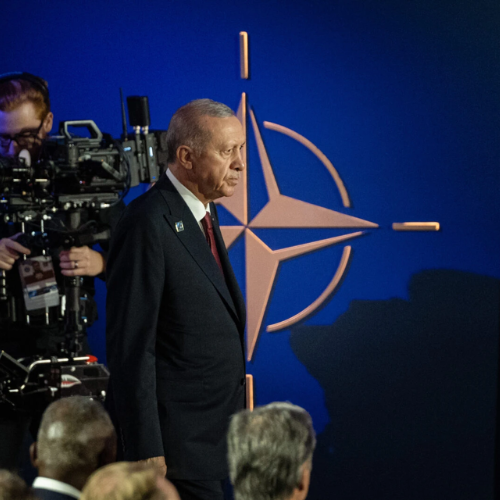An American-born Israeli settler, who moved to Israel in 2004, has stirred controversy by calling for Türkiye’s removal from NATO. In an article published in a pro-Israel news outlet, he accused Türkiye of pursuing “neo-Ottoman ambitions” and being hostile to Israel. This follows a series of actions and statements by Israeli officials and commentators that frame Türkiye as a destabilizing force in the region.
The article criticized Türkiye’s military presence in Syria and accused it of supporting groups that Israel opposes. The writer speculated that Türkiye’s actions could provoke conflicts involving NATO, Israel, or the United States. Such claims echo Israel’s increasing hostility toward Türkiye, as reflected in recent reports and statements by Israeli officials warning of potential conflicts with the country.
Israeli officials recently described Türkiye as a larger threat than Iran. A government report, often referred to as the Nagel Committee report, highlighted Türkiye’s growing influence in Syria and suggested boosting Israel’s defense spending in response. These warnings are part of a broader narrative to portray Türkiye as a destabilizing power while downplaying Israel’s ongoing expansion of settlements and its decades-long occupation of Palestinian territories.
Actions Escalating Regional Tensions
Türkiye’s strong criticism of Israel’s treatment of Palestinians and its support for international investigations into alleged war crimes has caused friction between the two nations. In response, Israel and its allies have increasingly targeted Türkiye with hostile rhetoric.
One particularly provocative move has been Israel’s engagement with Kurdish groups in Syria, which Türkiye considers terrorist organizations. Reports suggest that Israel’s foreign ministry has held discussions with representatives of these groups, including senior figures from the PKK, a group recognized as a terrorist organization by Türkiye, the U.S., and the EU. By working with these groups, Israel has angered Türkiye, which views the PKK as a major threat to its security.
Additionally, a pro-Israel commentator recently called for the United States to take military action against Türkiye’s forces in Syria. Such calls ignore Türkiye’s legitimate concerns about protecting its borders and combating terrorism. These statements reflect a pattern of escalating hostility toward Türkiye, with little regard for the complex realities on the ground.
Shifting Attention Away from Israeli Policies
Israel’s aggressive stance toward Türkiye seems to be part of a broader strategy to deflect attention from its own controversial actions. While Israel accuses Türkiye of expansionism, it continues to expand illegal settlements in the West Bank, a practice widely condemned by the international community.
The portrayal of Türkiye as a threat serves to distract from Israel’s occupation of Palestinian lands and allegations of human rights abuses. By framing Türkiye as an aggressor, Israel seeks to justify its own actions as defensive measures, despite its long-standing role in regional instability.
Türkiye’s strong advocacy for Palestinian rights and its criticism of Israel’s policies have made it a target for such narratives. Israeli commentators and officials have increasingly sought to isolate Türkiye diplomatically, portraying it as a destabilizing force while downplaying its legitimate security concerns.
Israel’s engagement with groups like the PKK and its inflammatory rhetoric about Türkiye risk further escalating tensions. This approach not only undermines the possibility of regional cooperation but also creates additional instability in an already fragile region.
The call for Türkiye’s removal from NATO reflects a deliberate effort by Israeli officials and commentators to demonize Türkiye and shift focus from Israel’s controversial actions in the occupied Palestinian territories. This growing hostility, coupled with provocative actions like engaging with Kurdish groups and issuing warnings about potential conflicts, further heightens tensions in the region. Such narratives, while aiming to isolate Türkiye, also risk creating new challenges for peace and stability in the Middle East.

